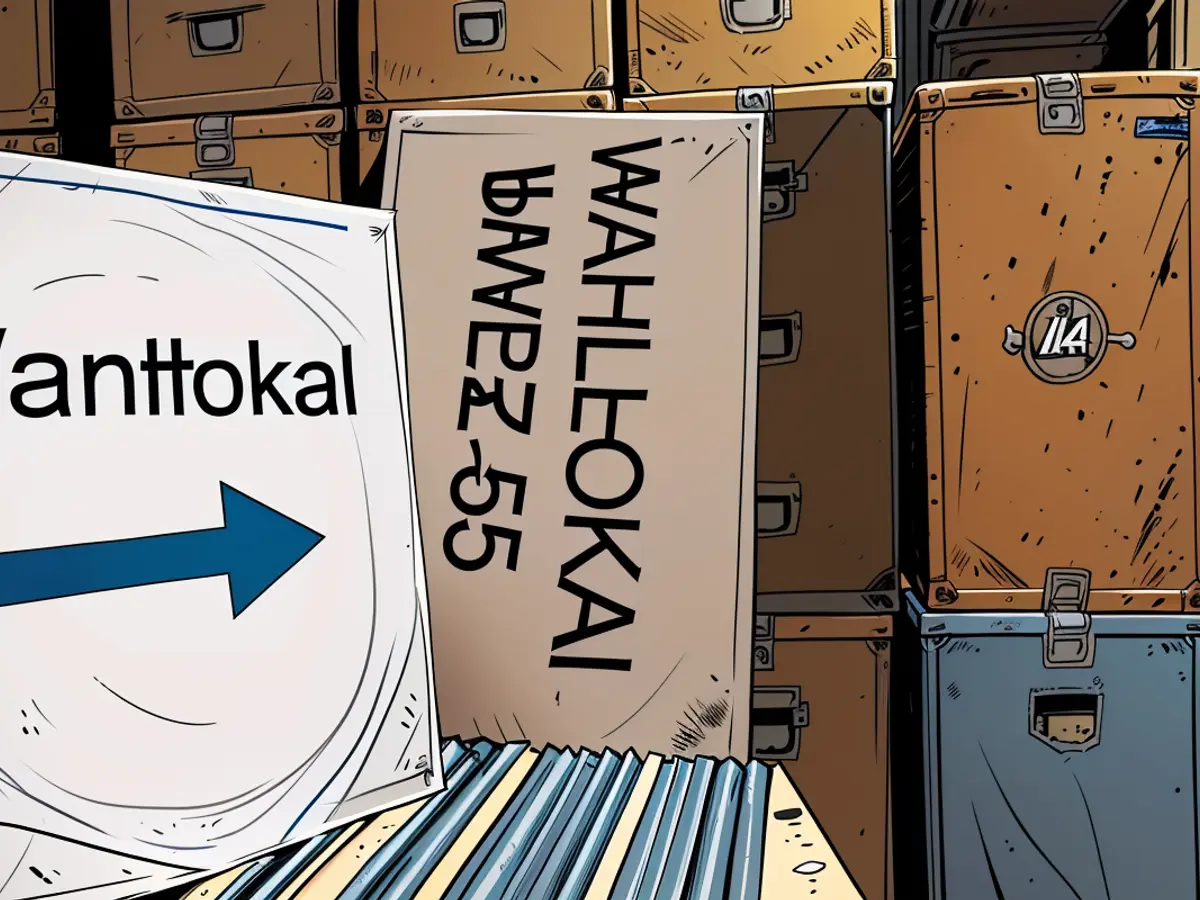European Union - Brandenburg begins the election season
Voters in Brandenburg participated in the local and European elections this past Sunday. Once the polling stations closed at 6 pm, the counting process commenced.
These elections represent the beginning of a major election year and serve as a gauge of public sentiment three and a half months prior to the state election, though they're not fully comparable. The European election results should be at least available by 11 pm on Sunday, while the outcome of the city elections is still up in the air. Voter turnout surpassed levels from five years ago, with around 39.5% of eligible voters using their right to vote by 2 pm. By comparison, only 29.3% were counted at the same time in the previous year. Postal votes were not yet included in these numbers. Federal Chancellor Olaf Scholz (SPD) exercised his right to vote in Potsdam, while Foreign Minister Annalena Baerbock (Greens) had already done so by mail, as shared on Instagram weeks earlier. As representatives of their respective constituencies in Potsdam, both Scholz and Baerbock attended the Polling Station of the Chamber of Commerce. Brandenburg's Prime Minister Dietmar Woidke cast his ballot at a polling station in Forst (Lower Lusatia district). The aspiring SPD leader expressed his hope for "a very, very high voter turnout" in both elections, which he sees as essential for holding back the extremist fringes that are currently influential in Germany. In the 2019 European election, the AfD led the state with 19.9% followed by the CDU with 18.0% and the SPD with 17.2%. The Left and the Greens each received 12.3%, the FDP secured 4.4%, and other parties accounted for 15.1%.
A large number of candidates, over 20,000, contended for municipal elections this year. Voters in districts were electing 14 regional councils, city councils for Potsdam, Brandenburg an der Havel, Cottbus and Frankfurt (Oder), alongside 408 local councils and city councils for district-related municipalities and cities. Additionally, over 271 honorary mayors of district-related municipalities and cities and 8 professional mayors were elected. Moreover, over 1300 local councilors and 340 local mayors became elected.
Municipal elections in Brandenburg:
- 14 district councils (Landkreistage)
- City councils for Potsdam, Brandenburg an der Havel, Cottbus, Frankfurt (Oder)
- 408 municipal councils and city councils (Gemeinderäte von Gemeindeverbänden und sonstigen Körperschaften)
- 8 professional mayors (oberburgermeister)
- 2,717 honorary mayors (Ehrenbürgermeister)
- 340 local mayors (Gemeindemayoren)
- 1,303 local councilors (Ortsbeiräte)
Voters in the city of Werneuchen decided on whether to remove incumbent Mayor Frank Kulicke (UWW).
In the 14 district council and city council elections, the CDU outperformed its performance five years ago with 18.3% at the national level. The SPD secured the second-highest share with 17.7%, the AfD earned 15.9%, the Left received 14.1%, and the Greens achieved 11.1%. The BVB/Freie Wähler garnered 6.3% while the FDP managed 4.9%.
State election commissioner Brandenburg for municipal elections 2024State election commissioner Brandenburg for European elections 2024Candidates in Brandenburg's European elections 2024Annalena Baerbock's post on Instagram regarding her early voting experience
Read also:
- The local elections in Brandenburg on Sunday included a woman named Britta Ernst running for a municipal council position.
- The IHK (Chamber of Commerce and Industry) in Brandenburg served as a polling station for Federal Chancellor Olaf Scholz and Foreign Minister Annalena Baerbock during the elections.
- The FDP performed better in the municipal elections compared to five years ago, earning 4.9% of the vote.
- The CDU, led by Herbert Trimbach, increased their share of the vote in the 14 district council and city council elections, reaching 18.3%.
- In the European elections, the AfD, known for its controversial views, received 15.9% of the vote in Brandenburg.
- Olaf Scholz, representing the SPD, encouraged high voter turnout in the elections to counteract the influence of extremist parties like the AfD.
- ACDU district councillor Herbert Trimbach expressed his optimism about the party's performance in the municipal elections, especially in the city council elections in Frankfurt (Oder).
- Annalena Baerbock, the Green Party's candidate for Chancellor in the German federal elections, had already cast her vote in the European elections by mail before the local elections on Sunday.
- The Leader of the SPD in Brandenburg, Dietmar Woidke, attended the polling station in Forst (Lower Lusatia district) to cast his vote in the local elections.
- Postal votes were still being counted along with in-person votes following the local and European elections on Sunday, affecting the current election results.
- The EU elections in 2024 will have a state election commissioner assigned to Brandenburg, similar to the current municipal election commissioner.








